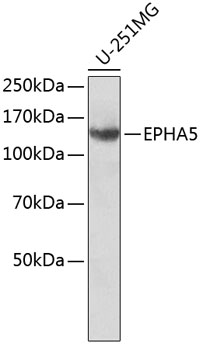-
Product Name
EPHA5 Monoclonal Antibody
- Documents
-
Description
Monoclonal antibody to EPHA5
-
Tested applications
WB, IHC
-
Species reactivity
Human
-
Alternative names
EPHA5 antibody; CEK7 antibody; EHK-1 antibody; EHK1 antibody; EK7 antibody; HEK7 antibody; TYRO4 antibody; EPH receptor A5 antibody
-
Isotype
Mouse IgG
-
Preparation
Antigen: Recombinant protein of human EPHA5
-
Clonality
Monoclonal
-
Formulation
PBS with 0.02% sodium azide, pH7.3.
-
Storage instructions
Store at 4℃. Avoid freeze / thaw cycles.
-
Applications
WB 1:500 - 1:2000
IHC 1:10 - 1:50 -
Validations

Western blot - EPHA5 Monoclonal Antibody
Western blot analysis of extracts of U-251MG cells, using EPHA5 antibody .Secondary antibody: HRP Goat Anti-Mouse IgG (H+L) at 1:10000 dilution.Lysates/proteins: 25ug per lane.Blocking buffer: 3% nonfat dry milk in TBST.
-
Background
Receptor tyrosine kinase which binds promiscuously GPI-anchored ephrin-A family ligands residing on adjacent cells, leading to contact-dependent bidirectional signaling into neighboring cells. The signaling pathway downstream of the receptor is referred to as forward signaling while the signaling pathway downstream of the ephrin ligand is referred to as reverse signaling. Among GPI-anchored ephrin-A ligands, EFNA5 most probably constitutes the cognate/functional ligand for EPHA5. Functions as an axon guidance molecule during development and may be involved in the development of the retinotectal, entorhino-hippocampal and hippocamposeptal pathways. Together with EFNA5 plays also a role in synaptic plasticity in adult brain through regulation of synaptogenesis. In addition to its function in the nervous system, the interaction of EPHA5 with EFNA5 mediates communication between pancreatic islet cells to regulate glucose-stimulated insulin secretion (By similarity).
Related Products / Services
Please note: All products are "FOR RESEARCH USE ONLY AND ARE NOT INTENDED FOR DIAGNOSTIC OR THERAPEUTIC USE"
